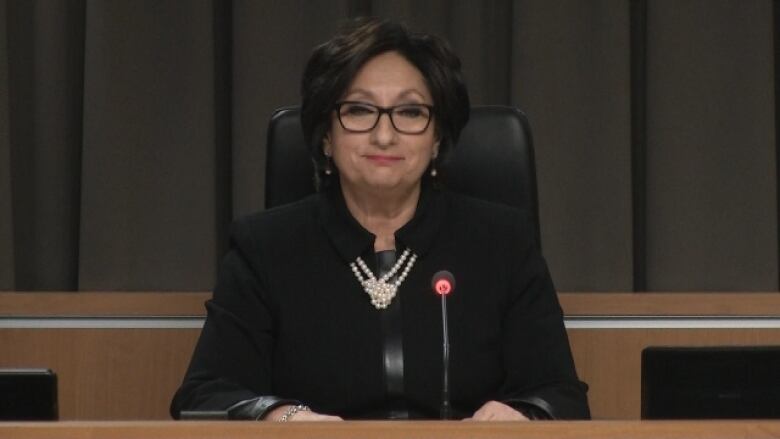Charbonneau commission wraps with call for confidence to be restored
Justice France Charbonneau says Quebecers must work together to restore confidence in public institutions

The justice presiding over the inquiry into corruption in Quebec's construction industry says confidence in Quebecs public institutions has to be restored, and thatis what she hopes to accomplish when she hands thefinal report tothe provincial government.
Justice FranceCharbonneaudelivered the closing statement Friday forthe public portion of the commission, after months of work and questioning dozens of witnesses.
Corruption and collusion, which both take place around the world, have an impact on Quebecers confidence, and have repercussions in all aspects of society, Charbonneau said.
She encouragedQuebecersto continue their quest for integrity.
Quebecershave shown their courage, and can be proud and hold their heads high.
Charbonneauand fellow commissionerRenaudLachanceheard from 189 witnesses over the last 2 years.
Whistle blowing encouraged
She said people have to continue to come forward when they see something wrong.
Whistleblowingshould no longer be seen as an act of treason, but rather it should be strongly encouraged as a gesture of great loyalty toward the public service, and all of society.
Charbonneausays everyone in Quebec must now work together.
We must now seize this opportunity weve been given to change things for the greatest benefit of all.
CharbonneauandLachancehave until April 19 to produce a final report.
Charestlaunched inquiry
Then Liberal PremierJeanCharestwas forced to launch the inquiry in 2011 after months of pressure from opposition parties.
Journalists from CBC French-language network Radio-Canada's investigative programEnqutewere the first to report on many of the corruption allegations that were eventually exposed before the commission.
Charbonneau thanked the work of investigative reporters for their role in bringing the stories of corruption in the construction industry to the forefront.
They serve as our watchdogs and all measures must be put in place to let them to do their work, free from obstruction, transparently and impartially, said Charbonneau.
But it was a leaked report from anti-collusion investigator and former Montreal police chief JacquesDuchesneauin fall 2011 that eventually forcedCharest'shand.
Duchesneaualleged a vast network of money-laundering, bid-rigging and kickbacks perpetrated by politicians, union officials, construction executives and organized crime.
He eventually repeated many of the allegations during explosive testimony before the commission in June 2012.
Some ofDuchesneau'sallegations were backed up by insiders such as former construction boss LinoZambito.
Zambitotestified in September 2012 that about a dozen companies colluded to inflate the price of municipal contracts when he first broke into the Montreal market.
Zambitoalso said municipal politicians and mobsters were in on the scheme.
As the commission heard more corroborating testimony, well-known public figures began to resign, with former Montreal mayor Grald Tremblaythe first to go in November 2012.
Although Tremblay was never directly implicated in any corruption scheme, many accused him of wilful blindness and he quit after mounting pressure.
Less than a week later, Laval Mayor Gilles Vaillancourt followed suit.
Vaillancourt was later arrested and is now facing charges of fraud, conspiracy, breach of trust and gangsterism.
- Montreal mayor steps down amid corruption allegations
- Laval mayor resigns amid corruption allegations
The commission also exposed ties between Quebec's construction unions and organized crime.
The president of the Quebec Federation of Labour, Michel Arsenault, stepped down in November 2013 in part because of the allegations.
- FTQ president Michel Arsenault to resign
- Michel Arsenault, ex-FTQ president, testifies at corruption inquiry
Arsenault's friend and colleague, Jocelyn Dupuis, was found guilty of fraud and forging documents in September.Dupuis is now appealing that conviction.
The commission also heard allegations of a massive fraud in the awarding of a contract to build the new McGill University Health Centre (MUHC) super hospital in Montreal.
Former MUHC CEO Arthur Porter is accused of accepting part of a $22.5-million bribe to award the contract to engineering firm SNC-Lavalin.Porter and top executives from SNC are now awaiting trial on several charges.
The final star witness at the commission was former construction boss Tony Accurso, who testified in September, after fighting for months in court to try to avoid appearing as a witness.
Accurso admitted to participating in illegal campaign financing, but denied allegations of influence peddling. Hecast many of his actions as helping to promote Quebec's economy.
- Tony Accurso tells corruption inquiry how he built his empire
- Tony Accurso says he never used his yacht for shady deals
Provincial politicians have emerged from the commission largely unscathed.
Although several former Liberal and PQ cabinet ministers were called to testify, including former Liberal deputy premier Nathalie Normandeau, there was no "smoking gun" linking provincial politicians directly to corruption allegations.












_(720p).jpg)


 OFFICIAL HD MUSIC VIDEO.jpg)
.jpg)



























































































